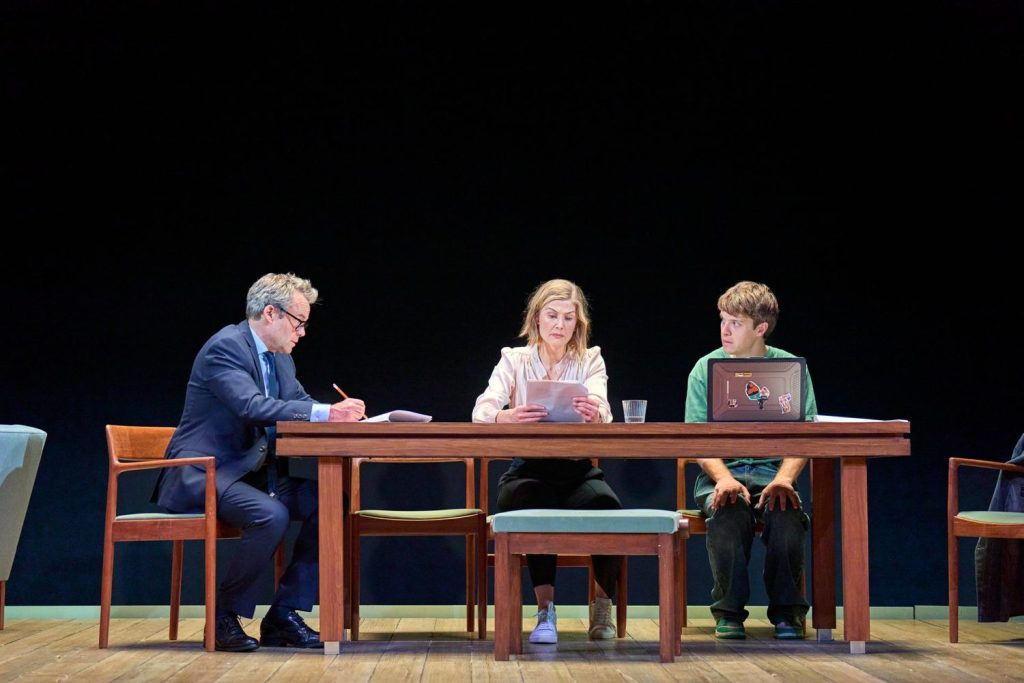It’s rare to see a play that doesn’t shy away from discomfort, and this one certainly doesn’t.
Inter Alia is a drama written by Suzie Miller, directed by Justin Martin, starring Rosamund Pike as Crown Court Judge Jessica Parks, with Jamie Glover as her husband Michael and Jasper Talbot as their son Harry. On the creative side, Miriam Buether designed set and costumes, Natasha Chivers handled lighting, Ben and Max Ringham created sound, Lucy Hind directed movement and intimacy, Willie Williams did video design, Erin LeCount and James Jacob composed music, and William Conacher coached voices.
You follow Judge Jessica Parks balancing her courtroom and her family. In early scenes, she is fiercely in control, high-powered, delivering judgments, mentoring others, singing Shania Twain in a karaoke bar just before her son enters the frame. Later, in the second act, she throws an impromptu dinner party for sixteen guests as her phone buzzes with court emergencies. By midway, that juggling is disrupted when her teenage son Harry becomes the subject of a serious criminal accusation, and Jessica confronts how her public ideals collide with her private life.
Pike’s Jessica often stands centre-stage, stalking between courtroom and home with deliberate, restless energy. In act one, she sharpens her sentences as easily as she seasons a roast, making you sense how she applies legal precision to everything, right down to parenting. That choice hardens her, so when later she falters in act two, that breakdown feels earned. Jamie Glover as Michael makes a pointed choice too: by delivering almost every line in casual understatement, he becomes quietly complicit in the imbalance of their family. Jasper Talbot’s Harry opts for silence and twitchy fidgets initially, turning into sudden, explosive anger later in the show, showing how confusion can erupt when a teen is unmoored.

Suzie Miller’s writing reaches for something big: it tries to map how motherhood, justice, and toxic masculinity clash and overlap. It is urgent and vivid. At its best, for instance when Jessica confronts Michael over the division of household labour they never talk about, it lands as heartbreak, not a lecture.
The staging helps that. One moment, the court dissolves into the kitchen: desks rotate into counters, and lighting shifts from cold to warm halfway through a monologue. You feel Jessica trapped in her own roles, slipping between them. Later, during a memory-like flashback, sound hums and quiet video projections appear of childhood laughter, then vanish, reminding you how fragile even good memories can be.
The play touches on themes that feel urgent now. It asks how to raise boys in a world of online pressure and pornography. Jessica gives her son a ‘talk’ about online porn, and you realise how heavy that responsibility is on mothers alone. It quietly connects with wider conversations about consent that are part of our everyday lives, especially in a time when families are still learning how men can play a better role in shaping young people. But it doesn’t claim to fix everything, just to hold the questions.
If you are ready for a play that feels like wrestling with big questions, this will grip you. But if you expect tidy surprises and lightness, it may feel heavy. You’ll come away impressed by Pike’s performance and by how the tension between home and law builds. It’s one of the best theatre shows of the year, but it’s not an easy watch.



